Are you a Nevada resident looking to understand the ins and outs of power of attorney? You’ve come to the right place. This guide will walk you through everything you need about power of attorney in the Silver State.
 Understanding Power of Attorney in Nevada
Understanding Power of Attorney in Nevada
Let’s start with the basics. Power of attorney sounds like legal jargon, but it’s straightforward.
Definition and Purpose
A power of attorney (POA) in Nevada is a legal document that gives someone else the authority to act on your behalf. Think of it as passing the baton of decision-making to someone you trust. Why might you need one? Well, life can be unpredictable. A POA ensures that your affairs are handled even if you’re unable to manage them yourself. It’s like having a trusted stand-in for important decisions.
Types of Power of Attorney
Nevada recognizes several types of power of attorney. Each serves a different purpose, so it’s essential to understand which one fits your needs.
- Conventional (limited) power of attorney is your basic, run-of-the-mill POA. It gives your agent specific powers for a limited time or transaction.
- A durable power of attorney: This POA remains effective even if you become incapacitated. It’s like a safety net for your future self.
- Financial power of attorney: As the name suggests, this POA focuses on economic matters. Your agent can manage your money, pay bills, and make financial decisions.
- Medical power of attorney: This POA deals with healthcare decisions. Your agent can make medical choices if you cannot do so yourself.
Requirements for a Valid Nevada Power of Attorney
Now that you know what a POA is and the types available, let’s talk about what makes a POA valid in Nevada.
Legal Formalities
Creating a valid POA is more complex than scribbling on a napkin. There are some essential legal hoops to jump through:
- It must be a written document.
- You (the principal) must sign it.
- It needs to be either notarized or signed by witnesses.
These requirements might seem like a hassle, but they protect you and ensure your wishes are clear.

Capacity Requirements
Only some people can create or be named in a POA. There are some critical capacity requirements to keep in mind:
- Sound mind of the principal: You must be sound when creating the POA. This means you understand what you’re doing and the implications of your decision.
- Age restrictions for agents: Your agent must be at least 18 years old and of sound mind.
Remember, a POA is a powerful document. These requirements help ensure it’s used responsibly and in your best interests.
Creating a Power of Attorney in Nevada
So, you’ve decided to create a power of attorney. Great choice! Let’s walk through the process step by step.
Choosing an Agent
Picking your agent is like choosing a teammate for a high-stakes game. You want someone you can trust implicitly. Here’s what to look for:
- Trustworthiness and reliability: This person will be making decisions on your behalf. Please make sure they’re someone you can count on.
- Willingness to serve: Being an agent is a big responsibility. Ensure your chosen person is up for the task.
- Legal capacity to enter contracts: Your agent must be at least 18 and of sound mind.
Pro tip: Talk to your potential agent before making it official. This will ensure that you’re both on the same page about expectations and responsibilities.
Scope of Authority
Now, let’s discuss what powers you’re granting. Think of it as handing over the keys to your life—you get to decide which doors those keys open.
General vs. limited powers:
- General: Your agent can handle almost all your affairs.
- Limited: You specify exactly what your agent can and can’t do.
Specific powers granted to the agent:
- This could include: Managing your finances
- Making healthcare decisions
- Handling real estate transactions
- Filing your taxes
Remember, you’re in the driver’s seat. You decide how much or how little authority to give.
Drafting the Document
Time to put pen to paper (or fingers to keyboard). Here are your options:
- Using statutory forms: Nevada provides ready-made POA forms. They’re like fill-in-the-blank templates for your POA.
- Customizing POA documents: Want something more tailored? You can create a custom POA that fits your unique needs.
- Professional assistance options: If legal documents make your head spin, consider getting help from a lawyer or legal service.
Executing and Maintaining a Power of Attorney
You’ve drafted your POA. Now what? Let’s make it official and keep it up to date.
Signing and Notarization
It’s time to make your John Hancock count. Here’s what you need to know:
- Proper execution procedures: Sign the document in the presence of a notary public or two witnesses.
- Notary public requirements: The notary must be licensed in Nevada and not related to you or your agent.
Filing Requirements
For most POAs, you don’t need to file anything. But there’s an exception:
- Recording with county recorder for real estate matters: If your POA involves real estate transactions, you must record it with your office.

Amendments and Revocation
Life changes, and your POA might need to change with it. Here’s how:
- Create a new POA document
- Explicitly state that it revokes the previous. Ous POA.
- Sign and notarize the new document.
Notifying relevant parties of changes:
- Let your agent, banks, doctors, and anyone else who might be involved know about the changes.
Remember, keeping your POA up-to-date is crucial. It ensures your current wishes are always reflected.
Special Considerations for Nevada POAs
Nevada has some unique quirks when it comes to power of attorney. Let’s dive into these special considerations to ensure you’re fully prepared.
Healthcare Decisions
When it comes to your health, you want to make sure your wishes are crystal clear. Here’s how to do that in Nevada:
- A living will integration: A living will specify your end-of-life care preferences.
- In Nevada, you can integrate your living will into your healthcare POA.
- This creates a comprehensive document called an “advance directive.”
- HIPAA authorization: HIPAA protects your medical privacy.
- Include HIPAA authorization in your healthcare POA.
- This allows your agent to access your medical records.
Pro tip: Discuss your wishes frankly with your healthcare agent. It’s not the easiest conversation, but it’s crucial for peace of mind.
Financial Matters
Money matters can be tricky. Here’s how to navigate financial POAs in Nevada:
Banking and investment powers:
- Your agent can manage bank accounts.
- They can make investment decisions.
- Specify the extent of these powers in your POA.
Real estate transactions
- Agents can buy, sell, or manage property on your behalf.
- Remember: Real estate POAs must be recorded with the county.

Durability and Springing Powers
- These features can make your POA more flexible. Let’s break them down:
Effectiveness during incapacity: A durable POA remains valid if you become incapacitated.
- Non-durable POAs terminate if you’re incapacitated.
- Activation upon specific events: A springing POA only becomes active under certain conditions.
- Example: It “springs” into effect if you’re declared mentally incompetent.
Legal Implications and Responsibilities
Creating a POA is a big deal. Let’s explore what it means for you and your agent.
Agent’s Fiduciary Duty
Your agent isn’t just doing you a favor – they have legal responsibilities:
Acting in the principal’s best interests:
- The agent must always put your interests first.
- They can’t use the POA for their benefit.
Accountability and record-keeping:
- Agents should keep detailed records of all transactions.
- They may need to provide an accounting of their actions.
Remember: Choose an agent who understands and respects these responsibilities.
Limitations of Power
Your agent might seem all-powerful, but there are limits:
Actions an agent cannot perform:
- Change your will
- Vote on your behalf
- Perform personal services (like getting married)
Safeguards against abuse:
- Nevada law allows you to name a third party to oversee your agent.
- You can require your agent to report regularly to this person.

Breaking It All Down
Breaking It All Down

Frequently Asked Questions
Frequently Asked Questions
What types of powers can I grant with a Nevada Power of Attorney?
You can grant various powers, including financial management, real estate transactions, healthcare decisions, etc. The specific powers depend on the type of POA you create and your needs.
Can I create multiple Powers of Attorney for different purposes?
Yes, you can create separate POAs for different aspects of your life, such as one for healthcare decisions and another for financial matters.
How long does a Power of Attorney last in Nevada?
A POA can last for a specified period or indefinitely, depending on how you draft it. A durable POA remains in effect even if you become incapacitated, while a non-durable POA terminates upon incapacitation.
Can I revoke a Power of Attorney after it's been executed?
Yes, as long as you are of sound mind, you can revoke a POA at any time by creating a new document that explicitly states your intention to rescind the previous POA.
Are there any limitations on what an agent can do under a Power of Attorney?
Yes, an agent cannot change your will, vote on your behalf, or perform personal services like getting married. Additionally, you can specify limitations in the POA document itself.
Do I need to register my Power of Attorney with the state of Nevada?
Generally, you don’t need to register a POA with the state. However, if the POA involves real estate transactions, it should be recorded with the county recorder’s office where the property is located.
Can I name more than one agent in my Power of Attorney?
Yes, you can name multiple agents. You’ll need to specify if they can act independently or if they must make decisions jointly.
What happens if my named agent is unable or unwilling to serve?
It’s wise to name alternate agents in your POA. If you don’t have alternates and your primary agent can’t serve, you may need to create a new POA or have the court appoint someone to manage your affairs.
Is a Power of Attorney created in another state valid in Nevada?
Generally, Nevada recognizes valid POAs from other states. However, for prolonged use in Nevada, creating a new POA that complies with Nevada laws is advisable.
Can a Power of Attorney be used to make end-of-life decisions?
While a healthcare POA can cover many medical decisions, end-of-life choices are typically addressed in a separate document called an advance directive or living will.

Additional Resources for You
Additional Resources for You
Our lead attorney, Molly Rosenblum, Esq., has not only distinguished herself through her legal expertise but also by creating an array of valuable resources aimed at assisting you during challenging times. These resources, thoughtfully curated on the Rosenblum Law website, provide comprehensive information and guidance on various aspects of family law in Nevada. Whether you’re navigating the complexities of the family court system, considering adoption, or need guidance on specific legal processes, these resources are designed to support and inform you:
Las Vegas Family Law Attorneys: A dedicated resource providing effective legal advice and representation in all areas of family law in Las Vegas. Explore here.
Family Court Las Vegas: Gain insights into navigating the family court system in Las Vegas, ensuring you’re well-prepared for the legal journey ahead. Learn more.
Common Law Marriage in Nevada: Understand the intricacies of common law marriage in Nevada and how it may pertain to your relationship. Read the details.
Name Change Las Vegas: A guide through the legal process of changing your name in Las Vegas, providing clarity and simplifying the procedure. Start the process.
How to File a Motion in Family Court: Step-by-step guidance on filing a motion in family court, an essential aspect of navigating family legal matters. Get the guide.
Family Court Mediation: Explore the benefits of mediation in resolving family disputes, a process that promotes cooperation and can lead to more amicable outcomes. Discover mediation.
Unbundled Attorney: Learn about the concept of unbundled legal services, offering a flexible and cost-effective option for legal representation. Understand your options.
Nevada Adoption: Navigate the adoption process in Nevada with valuable information and guidance, making your journey to parenthood clearer and more manageable. Begin the adoption process.
Molly Rosenblum, Esq., through these resources, demonstrates her commitment to providing not just legal services but also the knowledge and support essential during significant life transitions. We encourage you to make the most of these resources, crafted to assist and empower you in your time of need.

Offsite Resources You May Find Helpful
Rocket Lawyer: An online legal services company that provides legal information, attorney services, and a platform to create legal documents.
Investopedia: A leading source of financial content on the web, with educational content, investing advice, and market analysis.
Caring.com: A helpful resource for those caring for aging parents, spouses, or other elderly loved ones, providing information on elder care services, senior living options, and more.
ElderLawAnswers: A resource for information on elder law, long-term care planning, Medicaid, estate planning, and other legal issues related to aging.
Justia: A platform for free case law, codes, regulations, and legal information for lawyers, business, students, and consumers worldwide.
American Bar Association: The largest professional organization of lawyers in the US, providing law school accreditation, continuing legal education, and resources on a wide range of legal topics.

What's Next?
Are you a Las Vegas resident looking for help with your estate planning needs?
The Rosenblum Allen Law Firm has got you covered!
Our effective team of attorneys is here to provide innovative and tailored legal services catered to the specific requirements of our clients.
We understand that making decisions about one’s financial future can be overwhelming, so we make sure that every service we deliver provides the highest quality guidance and excellence in execution.
Our unparalleled dedication, expertise, trustworthiness, and dependability are just some of the reasons why countless local individuals have turned to us when it comes time for them to plan their estates.
Plus our flexible scheduling options allows for meetings at convenient times without disrupting your daily life commitments – all while staying within your budget!
Get started today by giving us a call at (702) 433-2889. Let’s get started together on creating an estate plan best suited for YOUR success story!




